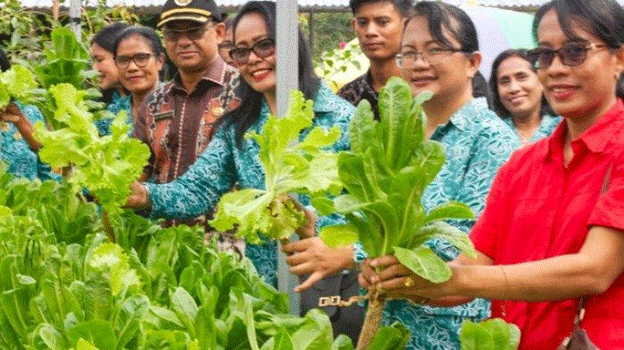Discover how the TP PKK management and members in East Sumba are transforming local food security with hydroponic vegetable farming. Read about their recent harvest and the implications for community nutrition and economic uplift.
In a proactive move towards enhancing local food security and nutrition, the TP PKK Secretariat in East Sumba has successfully harvested fresh lettuce from their 2×4 meter hydroponic garden located at the Hambala village, Waingapu district, on Thursday, June 13, 2024. This initiative not only showcases sustainable agricultural practices but also serves as a model for other PKK units across the region.
Adriana Ida Ndapa, SP, M.AP, Secretary of TP PKK East Sumba, highlighted the significance of this hydroponic garden as a pilot project for the district. “Today, coinciding with the provincial PKK supervision, we harvested hydroponic vegetables alongside all PKK units from various districts participating in the supervision since yesterday. The small garden at the TP PKK Secretariat serves as an example for potential replication at the district and village levels throughout East Sumba,” explained Adriana.
Support for this hydroponic vegetable garden initiative comes from the East Sumba Department of Agriculture and Food Crops, underlining a collaborative effort to promote sustainable agriculture and address nutritional challenges.
Nicolas Pandarangga, Head of the Department of Agriculture and Food Crops in East Sumba, expressed optimism about the project’s expansion. “We support the hydroponic vegetable cultivation initiative started by TP PKK. We hope this movement will expand to the district level, ensuring sufficient vegetable supply for families, thereby improving nutrition and economic conditions, and potentially addressing stunting issues,” Nicolas remarked.
The hydroponic vegetable garden at the TP PKK Secretariat in East Sumba exemplifies a forward-thinking approach to local agriculture, aiming to enhance food availability, nutrition, and economic resilience. With support from governmental departments and local communities, initiatives like these are pivotal in promoting sustainable practices and addressing nutritional challenges at broader scales.










